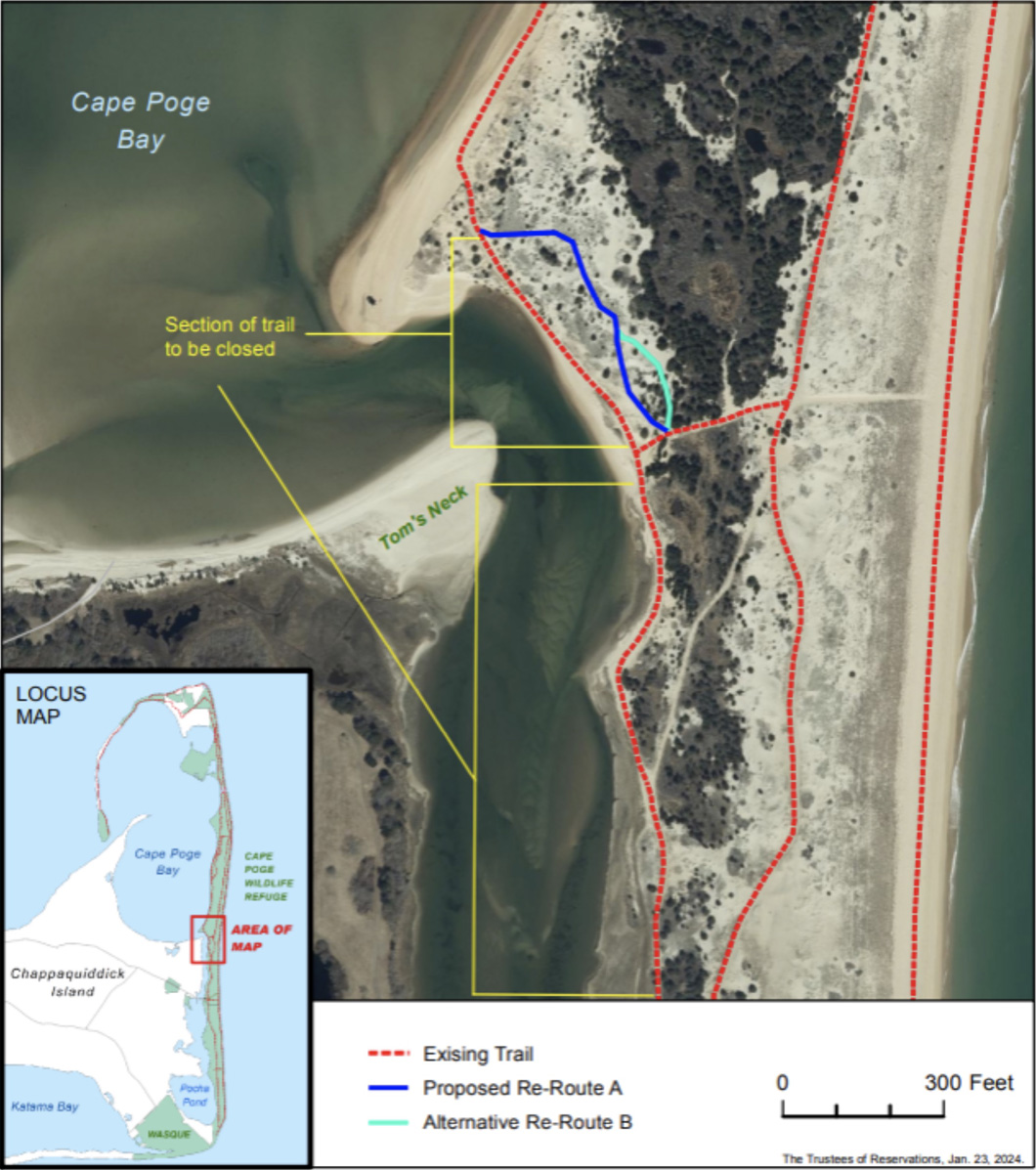Rising tides and shifting sands have The Trustees of Reservations in retreat on Cape Pogue.
The nonprofit, which oversees miles of oversand vehicle trails on Chappaquiddick, is proposing to retire about 1,300 feet of trail along the bayside of Cape Pogue because it now regularly becomes inundated by Cape Pogue Bay.
A popular spot with fishermen and beachgoers known as the Point, the section of trail is across from Tom’s Neck. But access is almost entirely cut off as high tides, persistent winds and sea level rise routinely flood the oversand vehicle trail.
In order to allow at least some traffic, the Trustees applied to the Edgartown conservation commission to cut about 600 feet of new trail further inland.

“In recent years, this crossover has become a pathway for flooding and storm surge, and it is becoming more difficult to designate an [oversand vehicle] corridor above the high tide line,” the Trustees wrote in an application to the Edgartown conservation commission. “The changing climate, and particularly increases in sea level rise, will likely accelerate future erosion at this location and without the proposed [oversand vehicle] trail modification, [oversand] vehicle access to the popular Point will be lost.”
But not everyone is on board.
The Trustees co-own the land with Chappy residents Bill Brine and Richard Brown. Both men objected to the application.
“We’re against it because we’re disturbing the land to get a road to nowhere,” Mr. Brine said at the June 26 conservation commission meeting. “If this could work, I’m all for it. I’ll say to anybody and everybody, this is my favorite place to go in the world and I wish everybody could go there and enjoy it. But it’s just gone, there’s nothing there.”
That two owners of the property were against the idea gave the conservation commission pause and the board vowed to check in with its attorney on the legality of the request and voted to continue the hearing to July 24, as well as schedule a trip to the area.
The Trustees maintain they are allowed to make the changes as the majority stakeholder.
“The other landowners certainly have the right to appeal, but we are the majority ownership of that land and we have the right to do the work, according to our counsel,” said Darci Schofield, the Islands portfolio director for the Trustees.
Legality aside, the Trustees said that the trail changes would be a net benefit and that this was an example of the organization’s belief in adaptive management — basically rolling with the punches dealt out by mother nature. Access would be preserved but there would be a smaller stretch of oversand vehicle trails. Any trees that need to be removed to build the new trail would be replaced twice over in the area.
The Trustees had an ally in the Martha’s Vineyard Beachgoers Association at last week’s meeting. The organization felt the change would be a help in getting people out to the Chappy beaches.
“Bayside access is so fundamental,” said president Peter Slikowski.
Some commissioners were unsure if the area could support more traffic.
“We all know it’s very dynamic,” said commission member Lillian Province. “I feel we have to be honest about this....I also don’t want to give false hope to the public.”
The application comes as much of the Trustees operations on Chappaquiddick are in limbo. In May, the conservation commission installed new vehicle limits on the oversand vehicle trails. Those limits are being challenged by the Trustees, which claims the caps are too low, as well as several Chappy residents, who claim they are too high.
The Trustees are also in the middle of a lawsuit with Cape Pogue land owner Victor Colantonio, and the nonprofit itself is suing the conservation commission.
Added to the mix, the town’s zoning board of appeal recently ruled that the Trustees have to reapply for a special permit or halt operations on Cape Pogue, adding another layer of scrutiny.
The twists and turns of the regulatory process have some would-be beachgoers wondering if it’s worth paying the $200-plus for an oversand vehicle sticker to get out on the sands. After going out on the trails for years with family, seasonal Vineyard Haven resident Skip MacElhannon was on the fence.
“I thought about buying one and then ran into the confusion,” he said. “At this point, until things get resolved, I don’t think I will.”
It’s unclear if the regulatory hoops have affected the Trustees sticker sales on the beach. Stickers skyrocketed during the pandemic, but the Trustees do not have to tell the town the number of stickers that are sold, town officials have said.
When asked about the number of permits that have been sold so far this year compared to the past, the Trustees declined to give too many details.
“It is difficult to compare this year’s sales to last year’s due to the fact we got a late start on OSV permit sales this season because of the long public hearing process by the Edgartown Conservation Commission,” spokesperson Mary Detloff said. “What is important is that we continue to sell permits and have taken great pride in watching Martha’s Vineyard residents and visitors enjoy the spectacular beaches and special places we steward on Chappaquiddick.”






Comments (6)
Comments
Comment policy »